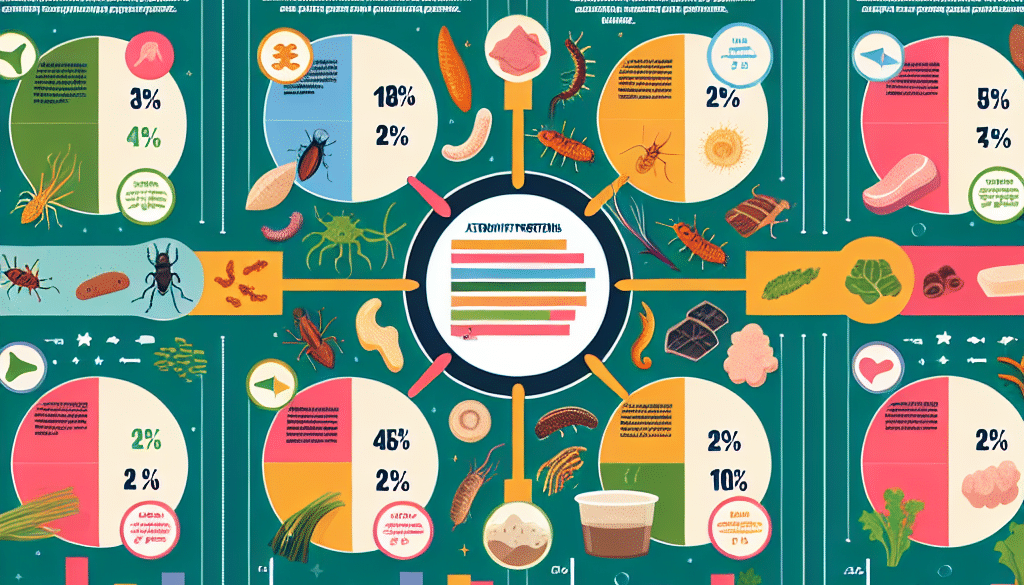How Are Different Alternative Proteins Perceived by Consumers?
-
Table of Contents
- Alternative Proteins and Consumer Perceptions: A Deep Dive
- Plant-Based Proteins: Leading the Charge
- Insect-Based Proteins: An Emerging Trend
- Lab-Grown Proteins: The Future of Meat?
- Consumer Attitudes and Market Trends
- Conclusion: Key Takeaways on Alternative Protein Perception
- Discover ETChem’s High-Quality Protein Products
Alternative Proteins and Consumer Perceptions: A Deep Dive

The global food landscape is undergoing a significant transformation as consumers increasingly seek out alternative protein sources. Driven by concerns over health, environmental sustainability, and animal welfare, the demand for plant-based, insect-based, lab-grown, and other non-traditional proteins is on the rise. This shift in consumer behavior is reshaping the food industry and prompting companies to innovate and diversify their product offerings. In this article, we will explore how different alternative proteins are perceived by consumers, examining the factors that influence their acceptance and the challenges they face in gaining mainstream popularity.
Plant-Based Proteins: Leading the Charge
Plant-based proteins, derived from sources such as soy, peas, and lentils, are at the forefront of the alternative protein market. These products are designed to mimic the taste and texture of animal proteins, offering a familiar experience to consumers looking to reduce their meat consumption.
- Health Benefits: Many consumers are drawn to plant-based proteins due to their perceived health benefits, including lower saturated fat content and the absence of cholesterol.
- Environmental Impact: The reduced environmental footprint of plant-based proteins, compared to traditional livestock farming, is a significant selling point for environmentally conscious consumers.
- Animal Welfare: Ethical considerations regarding animal treatment in the food industry also play a role in the popularity of plant-based proteins.
Despite these advantages, plant-based proteins face challenges such as taste and texture discrepancies compared to animal proteins, as well as higher prices. However, ongoing innovation and economies of scale are helping to address these issues.
Insect-Based Proteins: An Emerging Trend
Insect-based proteins are gaining attention as a sustainable and nutritious alternative protein source. Insects like crickets and mealworms are rich in protein, vitamins, and minerals, and they require significantly less land, water, and feed than traditional livestock.
- Cultural Acceptance: While common in many parts of the world, entomophagy (the practice of eating insects) faces cultural barriers in Western countries, where insects are often viewed as pests rather than food.
- Regulatory Hurdles: Insect-based food products must navigate complex food safety regulations, which can slow down their entry into new markets.
Consumer education and innovative product development, such as incorporating insect protein into familiar foods, are key strategies to increase acceptance of insect-based proteins.
Lab-Grown Proteins: The Future of Meat?
Lab-grown, or cultured, meat is produced by cultivating animal cells in a controlled environment. This technology promises to deliver real meat without the need to raise and slaughter animals.
- Ethical Considerations: Lab-grown meat addresses concerns about animal welfare and the ethical implications of meat consumption.
- Environmental Benefits: Cultured meat has the potential to significantly reduce the environmental impact of meat production, though the technology is still in its infancy.
Consumer acceptance of lab-grown meat is mixed, with some intrigued by the technology and others skeptical about the idea of meat produced in a lab. The high cost of production and regulatory approval are current obstacles to widespread adoption.
Consumer Attitudes and Market Trends
Consumer perceptions of alternative proteins are influenced by a variety of factors, including taste, price, health concerns, environmental impact, and ethical considerations. Market research indicates that:
- Younger generations, particularly Millennials and Gen Z, are more open to trying alternative proteins.
- Transparency in labeling and sourcing is important to consumers, who want to make informed choices about the foods they eat.
- Alternative proteins that can seamlessly replace animal proteins in recipes and meals are more likely to be embraced by consumers.
As the alternative protein market continues to grow, understanding and addressing consumer concerns will be crucial for companies looking to succeed in this space.
Conclusion: Key Takeaways on Alternative Protein Perception
Alternative proteins are gaining traction among consumers, driven by a combination of health, environmental, and ethical motivations. Plant-based proteins currently lead the market, with insect-based and lab-grown proteins emerging as promising but less established options. Consumer acceptance is influenced by factors such as taste, price, and cultural norms, and the industry must continue to innovate to overcome these challenges. As alternative proteins become more mainstream, they have the potential to play a significant role in the future of food.
Discover ETChem’s High-Quality Protein Products
If you’re looking for premium protein products, ETChem offers a range of collagens that cater to various industries. Their commitment to quality and customer satisfaction makes them a top choice for businesses seeking reliable protein solutions.
About ETChem:
ETChem, a reputable Chinese Collagen factory manufacturer and supplier, is renowned for producing, stocking, exporting, and delivering the highest quality collagens. They include marine collagen, fish collagen, bovine collagen, chicken collagen, type I collagen, type II collagen and type III collagen etc. Their offerings, characterized by a neutral taste, instant solubility attributes, cater to a diverse range of industries. They serve nutraceutical, pharmaceutical, cosmeceutical, veterinary, as well as food and beverage finished product distributors, traders, and manufacturers across Europe, USA, Canada, Australia, Thailand, Japan, Korea, Brazil, and Chile, among others.
ETChem specialization includes exporting and delivering tailor-made collagen powder and finished collagen nutritional supplements. Their extensive product range covers sectors like Food and Beverage, Sports Nutrition, Weight Management, Dietary Supplements, Health and Wellness Products, ensuring comprehensive solutions to meet all your protein needs.
As a trusted company by leading global food and beverage brands and Fortune 500 companies, ETChem reinforces China’s reputation in the global arena. For more information or to sample their products, please contact them and email karen(at)et-chem.com today.




